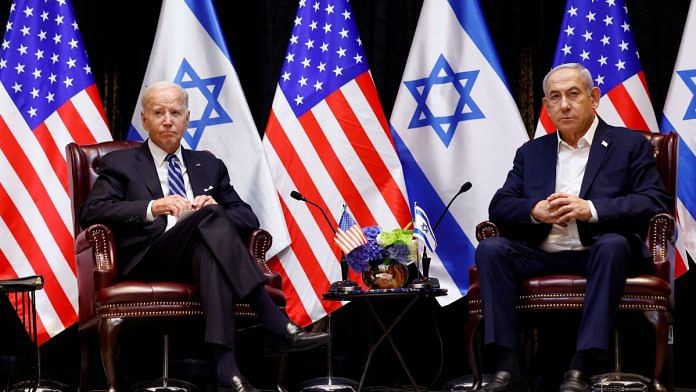This week, the Israel-Hamas war is completing two months without any sign of how it will end and when. Israel claims it is not a time-bound war—it will end with the elimination of Hamas, and for that, Israel will fight for however long it takes. Against the wishes of its friends and allies like the United States, European powers like Germany and France or Arab states like Jordan, Egypt, and UAE, Israel has evaded questions about how long its military will be operating in Gaza. Nor does it want to share with them its vision for post-Hamas Gaza, though it is highly unlikely that Hamas will be pushed out of Gaza by the Israeli military.
For Hamas, the war is all about escaping the Israeli military attacks, hiding in tunnels or in South Gaza with the civilian population. It still has around 130 Israeli hostages, as per Israel’s count, and this gives Hamas an advantage over them in the coming weeks. The seven-day pause in bombing was negotiated based on the release of 81 Israelis and an additional 24 foreign workers in exchange for 150 Palestinians detained in Israel. The people of Gaza had short respite and much-needed aid and assistance.
Rising tension between Netanyahu & Biden
US President Joe Biden has been a strong supporter of Israel, and he went the extra mile by travelling to Israel after the 7 October Hamas attack to show solidarity with the country on 18 October. The Biden administration’s military and financial support for Israel in the current crisis is part of the historical ‘special alliance’ between the two countries.
But the attack has derailed US diplomacy in the Middle East. With the Abraham Accords, I2U2 (a multilateral forum that includes Israel, India, UAE, and the US), the ongoing Saudi-Israel normalisation deal as well as the ambitious India-Middle East-Europe Economic Corridor announced at the G20 summit in Delhi, the US was reasserting its regional hegemony in the Middle East. It was in the process of developing a multi-pronged strategy to counter the growing influence of China and the aggressive Iranian agenda in the region, but all of it has paused for now.
The US and Arab states like Egypt, Jordan, UAE, and Saudi Arabia would like to see Hamas defeated in this war as much as they would like to see a political resolution of the Israel-Palestine conflict. Biden and Arab rulers are facing challenging questions from within their political establishment and larger civil society for their extended support of Israel. They will largely succeed in overcoming criticism if Israel Prime Minister Benjamin Netanyahu accepts the need for a ‘two-state’ political solution after the war.
Like a mantra, Biden has been repeating his principled stand for the Palestinian people, a two-state solution and Israel’s security. His deputy, Vice President Kamala Harris, presented the US vision for Gaza at the United Nations COP28 international conference held in Dubai on 2 December. According to her, there are five principles: “no forcible displacement, no reoccupation, no siege or blockade, no reduction in territory, and no use of Gaza as a platform for terrorism”. Except for the last principle, the first four are addressed to Netanyahu and the Israel Defence Forces (IDF). She also put forward three areas of focus—reconstruction of Gaza, strengthening of the Palestinian Authority Security Forces, and a transparent and responsive government in Gaza.
The same day, Netanyahu held a press conference during which he said he was least interested in the US vision for Gaza. “I am not prepared to delude myself and say that this defective thing (the Palestinian Authority), established under the Oslo Accords in a terrible mistake” should be allowed to govern Gaza, he said. But he didn’t offer an alternative idea or his vision for Gaza.
Also Read: Biden isn’t so fond of Netanyahu to grant him a blank cheque from the US
Netanyahu’s distrust of peace
Since his rise in Israeli politics from 1996, Netanyahu has been dismissive of and opposed to the Oslo peace process, and, according to many, he was one of the spoilers of the long peace process that began in 1993 and ended around 2001. Interestingly, he invokes the Oslo peace process to disagree with Biden, US Secretary of State Antony Blinken, and Vice President Kamala Harris, which will be highly frustrating to them. The previous Democratic president, Bill Clinton, was highly irked by Netanyahu’s efforts to derail the Oslo peace process. Once again, Netanyahu’s personal politics and his vested interest in remaining in power are raising tensions between Israel and the US.
The US doesn’t want to continue supporting Israel’s military operation without a commitment to the two-state solution. It also works as the best possible political face-saver of US diplomacy in the region, where it is perceived as too forgiving of Israel to be a mediator for the Palestinian cause. Netanyahu was once powerful enough to ignore Clinton and later Barack Obama on the two-state solution; he is now much weaker and Israel needs help to defend itself. Still, Netanyahu is incorrigible. He’s putting on a brave face for his Right-wing supporters by opposing Biden.
Netanyahu is a hardliner, not a peacemaker. That’s how he has become the most successful Right-wing leader of Israel—aggressive and unilateral when it comes to the Palestinians and Machiavellian and evasive when it comes to pressures from the US or international organisations like the United Nations. He was regarded as the best conflict manager and was called Mr Security by the Israelis. Ironically, it is under him that Israel stands exposed and vulnerable. He failed to pre-empt the 7 October attack or even have an effective plan to recover hostages from Gaza.
Dr Khinvraj Jangid writes from Tel Aviv. He is Associate Professor and Director, Centre for Israel Studies, Jindal School of International Affairs, OP Jindal Global University, Sonipat. He is visiting faculty at Ben-Gurion University of the Negev, Israel. Views are personal.
(Edited by Theres Sudeep)



